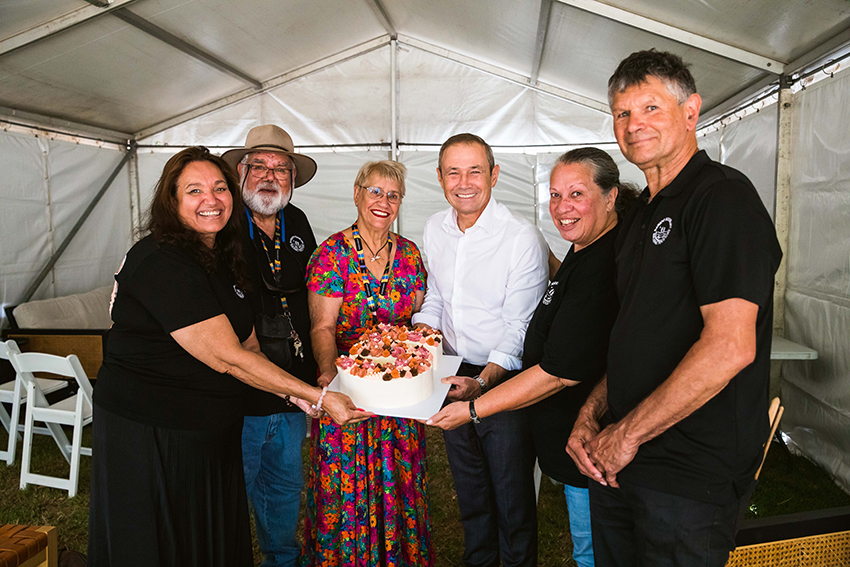This case study relates to Action 1 in the Kep Katitjin – Gabi Kaadadjan Waterwise action plan 3 delivered by the Department of Water and Environmental Regulation and Water Corporation.
Danjoo Koorliny is a bold, long-term, large-scale, Aboriginal-led systems change project to help all of us – in Western Australia, the rest of Australia and around the world – walk together as Aboriginal and non-Aboriginal people to co-create a better future for all. The first milestone is in 2029 (200 years of colonisation in Perth), and the project will go far beyond Western Australia’s bicentenary. Begun in 2019 by Noongar leaders Dr Noel Nannup OAM, Dr Richard Walley OAM, Carol Innes AM and Professor Emeritus Colleen Hayward AM, it is based at The University of Western Australia’s Centre for Social Impact, in the Business School.
In 2020, George Walley and Bronte Grant presented the co-authored Bring Together Walk, Together Framework at Danjoo Koorliny’s Social Impact Festival Kep Water Symposium. This was the beginning of deeper working between the Department of Water and Environmental Regulation and Danjoo Koorliny, centring on including Danjoo Koorliny invaluable advice and guidance in Kep Katitjin – Gabi Kaadadjan Waterwise Perth action plan 2, including suggesting its name and launching the plan.
Shortly after the plan’s launch in October 2022, the department’s Waterwise Program Manager commenced a placement with Danjoo Koorliny, to more deeply deliver Aboriginal outcomes through the Waterwise program. Over the 18-month placement, together we reached thousands of people across the world, Australia and locally to share the importance of Aboriginal involvement in planning and delivery for water and the environment and how it can create systems change. Dedication of a government resource into an Aboriginal-led project has provided additional capacity and resources, and has allowed the department to directly access Aboriginal advice and guidance and learn Aboriginal ways of working. This has been translated back into projects and approaches, beginning to create change in the organisation and beyond.
Working together on kep and Boodja issues is a strong place to start healing – by healing Country together we can begin to heal the deep wounds and wrongs of the past. We know that Aboriginal people hold profound knowledge of Country that existed long before our newer scientific approaches and this knowledge is constantly found to be technically robust and indeed more connected and holistic than our current siloed and specific ways of empirical research. Increasingly we are recognising and appreciating that this knowledge is the right way for this Country, rather than our imposed European ways. The recognition of Noongar seasons for the south-west of Western Australia is an ideal example of this. For two centuries we have tried to work with four ill-fitting seasons on this Country and we are now recognising that seasonal changes are more subtle and more frequent.
The Waterwise program vision is for 2030 and aligns to the timeframe and path to the 2029 bicentenary. While ‘walking together’ means we move forward side by side, we recognise that who leads and who follows can and should change throughout the journey. A foundation of shared values, mutual respect and genuine collaboration that is rooted in deep listening and understanding is essential. Knowing when to lead, when to follow, and when to be alongside relies on trust and we acknowledge that we will not always get it right. However, through the exchange of knowledge, the sharing of power, and building of trust, we are navigating the complexities of partnership together.



